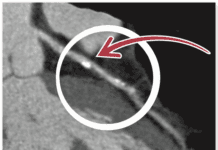The term atrial fibrillation (AFib) refers to an irregular rhythm (arrhythmia) that begins in the atria of the heart. People with AFib have an increased risk of stroke and heart attack because an arrhythmia can increase the risk of developing blood clots. The classic risk factors for AFib include comorbid conditions such as valve disease, diabetes, and hypertension, but in recent years, risk factors such as alcohol abuse, obesity, and sleep apnea have been linked to dangerous arrhythmias. "Alcohol abuse can cause cardiomyopathy (deterioration of the heart muscle), which increases the risk of AFib," says Bruce Wilkoff, MD, a staff cardiologist in the Department of Cardiovascular Medicine, Section of Cardiac Pacemakers and Electrophysiology, at Cleveland Clinic. "Just one alcohol binge can induce an episode of atrial fibrillation."
To continue reading this article or issue you must be a paid subscriber.
Sign in






